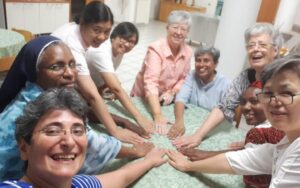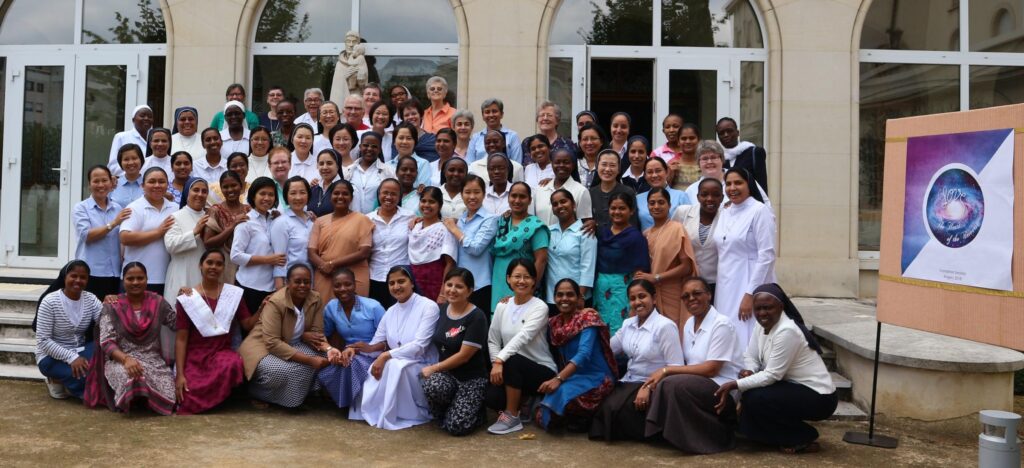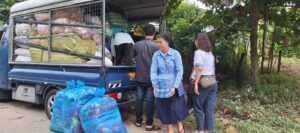Sister Josita was born in Sri Lanka, where she made her temporary profession in 1991 and her perpetual profession in 1996. She was first elected to the Congregational Leadership Team in the General Chapter of 2015, serving under the leadership of Sister Ellen Kelly. Following her recent reelection to the team, she shares with us something of her journey and her desires for the next six years.
You are the only sister on the new Congregational Leadership Team to have served on the previous outgoing team; what learning from that experience will you carry into the new team?
When I first arrived to serve on the Congregational Leadership Team in 2015, I stepped out from the small reality of my island into the larger reality of our global Congregation. On the team, we were from eight different nationalities. As I embraced a culturally diverse team of sisters, I began to appreciate our cultural diversity and each one’s unique experience of the mission of the Congregation. We came with open and willing hearts to share our gifts with one another and the Congregation.
Through co-learning and wisdom sharing, we created team; I learned from each sister as we connected with the Congregation. I learned a lot from Sr. Ellen Kelly’s natural and friendly approach and how she showed appreciation and built relationships. She had a special way of connecting to each one and to the Congregation as a whole. I saw how through building healthy working relationships, great things can happen!

I also experienced a deepening of my own spiritual journey. This was nurtured and made possible by being part of a team that took time to share ideas, readings, reflections, and meaningful conversations. We took time to ask ourselves questions, including what it meant to be a religious and a leader during these challenging times and the crisis situation of Covid.
I witnessed a shift occur, as God was revealed not to be out there but rather present within us and around us. This shift connected with the spirituality of our whole Congregation. St. John Eudes beautifully said that “we should be so many Christs here on earth, continuing his life and his works…in the Spirit of Jesus,” and Mary Euphrasia said, “just love!”. Both invite us to make Christ come alive in who we are and what we do. With this shift, I came to experience leadership in a new way – we are all together in this mission journey, all collaborators for mission.
As I look forward with eager anticipation to embrace my new team, I will carry with me a deep awareness that it is not so much about what we do but how we do it that matters. An invitation to strengthen our relationships among us and with our sisters and partners in mission around the world – so that we can embark on this next stage of our journey together, giving the best of ourselves for mission, conscious of the many calls for our creative responses.
You mentioned the challenge of Covid during your previous mandate; how did it affect your ministry as Congregational Councilor, and how did you work to overcome the new challenges it posed?
When Covid struck, our reality of visiting sisters and partners in mission at the grassroots level came to a standstill. Of course, I really missed those visits; I missed the interactions and the conversations that have always enriched me and connected me with our global mission. But the blessing in disguise of this unanticipated crisis that we were all so unprepared for was how technology actually allowed us to open up to the wider Congregation, to increase our interactions, have further meaningful conversations, and hear more voices. This new reality has enabled more people to be part of the journey of our Congregation.
For example, we developed our online webinars with Br. Philip Pinto. These sessions allowed so many sisters and partners in mission to come together as communities to reflect on their journey as people committed to mission. We heard wonderful echoes about these sessions. Communities gathered for conversations that have enabled them to connect with one another in a deeper way. It has also made creative responses possible in their commitment to mission. I remember one community sharing with us their simple yet powerful way of being in solidarity with the people by giving up their pocket money to share with some families struggling due to the pandemic. These conversations have allowed something new to emerge in hearts, as commitment to the mission was refreshed.
Covid also created a profound awareness among us of our interconnectedness with the suffering of humanity and the planet. We are one – what happens in one part of the world affects the whole. We were called to imagine what is possible in this crisis, to acknowledge our own vulnerabilities. It also allowed us to realize that it is only when we acknowledge the vulnerability of our own self that we can reach out to others in their vulnerability. Somehow, amid the suffering caused by Covid, something beautiful emerged – a deeper sense of our interconnectedness.
You have been involved in formation in so many of your ministries. Can you share with us something of your understanding and vision of formation?
When, in 2018, we held the ‘Love, the Heart of the Universe’ sessions in Angers for sixty-four of our younger sisters from twenty-seven countries around the world, it was striking to see that what was common among the sisters was their deep longing to be accompanied to become “the best of who we are.”

And, yes, formation should be the key that unlocks us to become the best of who we are called to be for mission. It is the space that offers us the chance to recognize who we are and identify the work God is calling us to do. But at times, our structures of religious life have not been able to create these sacred spaces for sisters to grow.
Formation needs to be holistic; it needs to encompass spiritual formation, human development, leadership development, capacity building, etc. Moving forward, we need to adopt an integrated approach of formation that will enable us to be a contemplative and prophetic presence; persons imbued with the love of God, willing and ready to be in solidarity and risk our lives for those left behind. As we talk of radical transformation in the Congregation, what does this mean for us personally and collectively?
When I talk of formation, it includes all those who share our mission – sisters and partners in mission. And as we continue to embrace partnership, we are invited to expand our vision of formation not only for religious life but also for mission effectiveness, for formation that is transformative. It is a shared journey of formation that we are called to make together, learning from each other, growing together, and envisioning our shared future; a collective journey.
Thinking of your own formation, do you have any role models who enabled you to become the best of who you are called to be?
My first role models are my parents and then – equally – the many sisters with whom I have shared life.
When I think of my mother’s formative role, I am reminded of the words in Jeremiah 1:15. Even before I came to be, I was being ‘knit together in my mother’s womb’. My mother taught chemistry at Good Shepherd Convent girls’ school in Kotahena, Sri Lanka; working with the Congregation, she imbued its spirit and charism and even gave me ‘Euphrasia’ as one of my names.
Picture three: Sr. Josita as a young girl with her parents and younger brother.
She and my father played a vital role in enabling me to become who I am. My mother was a gentle and caring person – full of humanity. She had a heart sensitive to people’s sufferings. Her students found in her a friend and teacher whom they turned to. Accompanying her after school to the single mother’s center, where she offered psychological counseling to the girls and women, I too learned to be sensitive to the pain of others. From my father, I learned generosity of spirit as I watched him welcome the poor into our home to offer them a bath to wash and cleanse themselves. I learned from my parents the gift of forgiveness and having a heart of gratitude; I learned to be grateful for the simplest things in life. Yes, formation is ongoing and lifelong, but these early formative experiences have touched me, formed me, and enabled me to become the person I am today.
Finally, would you like to share with us something of your desire for the next six years ahead?
My deep desire for the next six years is to co-create the future that is waiting to emerge as we continue to journey together. The calls to action of the Chapter are an invitation to radical transformation, transformation that will be enabled through our commitment to Universal Justice. We all need each other on this journey: sisters, partners in mission, and program participants – all of us together can make a difference.
The emerging future that we are entering into is unknown – God is with us in this journey. We entrust the unknown future to our known God. God is faithful, and it is God’s dream; it is God’s mission that we are fulfilling here. Unless we are all together on this journey, we cannot fulfill what God wants of us. This is my desire: that we journey together, as we commit to be ‘Drawn by Love, Passionate for Justice’.






